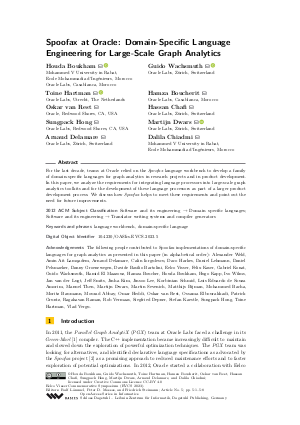Spoofax at Oracle: Domain-Specific Language Engineering for Large-Scale Graph Analytics
Authors
Houda Boukham  ,
Guido Wachsmuth
,
Guido Wachsmuth  ,
Toine Hartman
,
Toine Hartman  ,
Hamza Boucherit,
Oskar van Rest,
Hassan Chafi,
Sungpack Hong,
Martijn Dwars
,
Hamza Boucherit,
Oskar van Rest,
Hassan Chafi,
Sungpack Hong,
Martijn Dwars  ,
Arnaud Delamare,
Dalila Chiadmi
,
Arnaud Delamare,
Dalila Chiadmi
-
Part of:
Volume:
Eelco Visser Commemorative Symposium (EVCS 2023)
Part of: Series: Open Access Series in Informatics (OASIcs)
Part of: Conference: Eelco Visser Commemorative Symposium (EVCS) - License:
 Creative Commons Attribution 4.0 International license
Creative Commons Attribution 4.0 International license
- Publication Date: 2023-03-21
File

PDF
OASIcs.EVCS.2023.5.pdf
- Filesize: 2.41 MB
- 8 pages
Document Identifiers
Subject Classification
ACM Subject Classification
- Software and its engineering → Domain specific languages
- Software and its engineering → Translator writing systems and compiler generators
Keywords
- language workbench
- domain-specific language
Metrics
- Access Statistics
-
Total Accesses (updated on a weekly basis)
0PDF Downloads0Metadata Views
Abstract
For the last decade, teams at Oracle relied on the Spoofax language workbench to develop a family of domain-specific languages for graph analytics in research projects and in product development. In this paper, we analyze the requirements for integrating language processors into large-scale graph analytics toolkits and for the development of these language processors as part of a larger product development process. We discuss how Spoofax helps to meet these requirements and point out the need for future improvements.
Cite As Get BibTex
Houda Boukham, Guido Wachsmuth, Toine Hartman, Hamza Boucherit, Oskar van Rest, Hassan Chafi, Sungpack Hong, Martijn Dwars, Arnaud Delamare, and Dalila Chiadmi. Spoofax at Oracle: Domain-Specific Language Engineering for Large-Scale Graph Analytics. In Eelco Visser Commemorative Symposium (EVCS 2023). Open Access Series in Informatics (OASIcs), Volume 109, pp. 5:1-5:8, Schloss Dagstuhl – Leibniz-Zentrum für Informatik (2023)
https://doi.org/10.4230/OASIcs.EVCS.2023.5
BibTex
@InProceedings{boukham_et_al:OASIcs.EVCS.2023.5,
author = {Boukham, Houda and Wachsmuth, Guido and Hartman, Toine and Boucherit, Hamza and van Rest, Oskar and Chafi, Hassan and Hong, Sungpack and Dwars, Martijn and Delamare, Arnaud and Chiadmi, Dalila},
title = {{Spoofax at Oracle: Domain-Specific Language Engineering for Large-Scale Graph Analytics}},
booktitle = {Eelco Visser Commemorative Symposium (EVCS 2023)},
pages = {5:1--5:8},
series = {Open Access Series in Informatics (OASIcs)},
ISBN = {978-3-95977-267-9},
ISSN = {2190-6807},
year = {2023},
volume = {109},
editor = {L\"{a}mmel, Ralf and Mosses, Peter D. and Steimann, Friedrich},
publisher = {Schloss Dagstuhl -- Leibniz-Zentrum f{\"u}r Informatik},
address = {Dagstuhl, Germany},
URL = {https://drops.dagstuhl.de/entities/document/10.4230/OASIcs.EVCS.2023.5},
URN = {urn:nbn:de:0030-drops-177756},
doi = {10.4230/OASIcs.EVCS.2023.5},
annote = {Keywords: language workbench, domain-specific language}
}
Author Details
- Mohammed V University in Rabat, Ecole Mohammadia d'Ingénieurs, Morocco
- Oracle Labs, Casablanca, Morocco
Acknowledgements
The following people contributed to Spoofax implementations of domain-specific languages for graph analytics as presented in this paper (in alphabetical order): Alexander Weld, Amin Ait Lamqadem, Arnaud Delamare, Calin Iorgulescu, Daco Harkes, Daniel Lehmann, Daniel Pelsmaeker, Danny Groenewegen, Davide Basilio Bartolini, Eelco Visser, Felix Kaser, Gabriel Konat, Guido Wachsmuth, Hamid El Maazouz, Hamza Boucher, Houda Boukham, Hugo Kapp, Ivo Wilms, Jan van der Lugt, Jeff Smits, Jinha Kim, Jinsoo Lee, Korbinian Schmid, Luis Eduardo de Souza Amorim, Manuel Then, Martijn Dwars, Martin Sevenich, Matthijs Bijman, Mohammed Bacha, Moritz Baumann, Mourad Abbay, Omar Heddi, Oskar van Rest, Ossama Elbourakkadi, Patrick Gruntz, Ragahavan Raman, Rob Vermaas, Siegfried Depner, Stefan Kaestle, Sungpack Hong, Toine Hartman, Vlad Vergu.
References
- Sungpack Hong, Hassan Chafi, Edic Sedlar, and Kunle Olukotun. Green-marl: A dsl for easy and efficient graph analysis. In Proceedings of the Seventeenth International Conference on Architectural Support for Programming Languages and Operating Systems, ASPLOS XVII, pages 349-362, New York, NY, USA, 2012. Association for Computing Machinery. URL: https://doi.org/10.1145/2150976.2151013.
- Lennart C.L. Kats and Eelco Visser. The spoofax language workbench. In Proceedings of the ACM International Conference Companion on Object Oriented Programming Systems Languages and Applications Companion, OOPSLA '10, pages 237-238, New York, NY, USA, 2010. Association for Computing Machinery. URL: https://doi.org/10.1145/1869542.1869592.
-
Gabriël Konat. Language-Parametric Methods for Developing Interactive Programming Systems. PhD thesis, Delft University of Technology, Delft, Netherlands, November 2019.

- Gabriël Konat, Lennart Kats, Guido Wachsmuth, and Eelco Visser. Declarative name binding and scope rules. In Software Language Engineering, 5th International Conference, SLE 2012, Dresden, Germany, September 26-28, 2012, Revised Selected Papers, volume 7745, pages 311-331, January 2013. URL: https://doi.org/10.1007/978-3-642-36089-3_18.
- Neo4j. Cypher query language, 2022. URL: https://neo4j.com/developer/cypher/.
- Oracle. Pgql property graph query language, 2022. URL: https://pgql-lang.org.
- Oracle. Pgx documentation, 2022. URL: https://docs.oracle.com/cd/E56133_01/latest/reference/analytics/pgx-algorithm.html.
- Martin Sevenich, Sungpack Hong, Oskar van Rest, Zhe Wu, Jayanta Banerjee, and Hassan Chafi. Using domain-specific languages for analytic graph databases. Proc. VLDB Endow., 9(13):1257-1268, September 2016. URL: https://doi.org/10.14778/3007263.3007265.
- Tinkerpop. Tinkerpop, gremlin, 2022. URL: https://github.com/tinkerpop/gremlin/wiki.
- Oskar van Rest, Sungpack Hong, Jinha Kim, Xuming Meng, and Hassan Chafi. Pgql: A property graph query language. In Proceedings of the Fourth International Workshop on Graph Data Management Experiences and Systems, GRADES '16, New York, NY, USA, 2016. Association for Computing Machinery. URL: https://doi.org/10.1145/2960414.2960421.
-
Eelco Visser. A family of syntax definition formalisms. Technical Report P9706, Programming Research Group, University of Amsterdam, August 1997.

-
Eelco Visser. Syntax Definition for Language Prototyping. PhD thesis, University of Amsterdam, September 1997.

-
Guido H. Wachsmuth, Gabriël D. P. Konat, Vlad A. Vergu, Danny M. Groenewegen, and Eelco Visser. A language independent task engine for incremental name and type analysis. In Martin Erwig, Richard F. Paige, and Eric Van Wyk, editors, Software Language Engineering, pages 260-280, Cham, 2013. Springer International Publishing.

